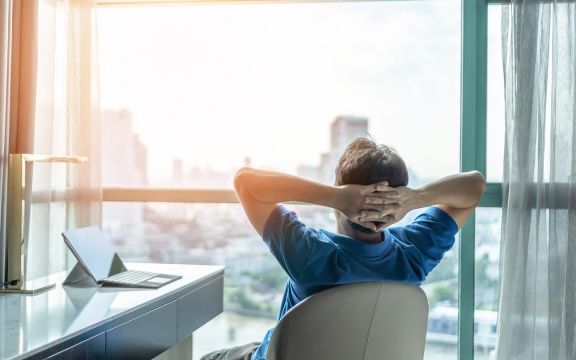As social distancing and shelter-in-place guidelines extend throughout the state and nation, we’re realizing that facing the challenge of COVID-19 will be like running a marathon, requiring mental and physical resiliency. Like any challenge, taking on healthy habits will go a long way toward strengthening bodies, boosting immunity and bolstering spirits. To help equip your workforce during these uncertain times, we’ve collected the following practical health and wellness tips from experts throughout Vanderbilt University Medical Center (VUMC):
Keep an eye on nutrition: Fewer trips to the grocery store for fresh food and more stress eating during the pandemic can take a toll on our health. Fran Blackman, RD, CDE, LDN, a VUMC nutritionist, offers a few tips for making better food choices:
- Prioritize protein. For breakfast, choose toast with peanut butter, a boiled egg, Greek yogurt and fruit, or apple with peanut butter instead of cereal or pastries. If you need a snack, grab peanut butter and crackers or cheese and crackers instead of a bag of chips.
- Limit sodium. Adults should aim for less than 2,400 mg. of sodium a day. Consider foods with 300 mg or more of sodium as red flags. Choose frozen vegetables over canned, but if you buy canned vegetables, choose “no sodium added” versions. Be careful with cheese portions and try Swiss cheese, which has about one-third of the sodium of other varieties.
- Cut back on sugar. Comfort foods, which people turn to when they’re stressed, tend to be high in fat and sugar. “The more sugar you eat, the more sugar you crave,” Blackman said. Instead of a sugary snack, eat a piece of fresh fruit, or a fruit cup packed in its own juice. If you’re a sweet iced tea drinker, try a half sweet, half unsweet version.
- Check out more nutrition tips here.
Safeguard your emotional health: Rosemary Cope, a clinician with the Employee Assistance Program, says it’s common to experience fear and worry about our own health and that of loved ones during this time. Sleeping and eating patterns might also change, and chronic conditions can worsen from the effects of stress. She offers the following suggestions for bolstering emotional wellbeing:
- Don’t isolate yourself. If you’re working at home, use your lunch hour to call or video chat a friend who’s also working remotely. In the evenings, organize online games over platforms like Google Hangouts, FaceTime or Zoom.
- Avoid excessive exposure to media coverage of COVID-19. People can become more distressed if they see repeated images or hear repeated stories about the outbreak in the media, so keep your checks of the news to a very narrow timeframe each day.
- Make time to unwind and remind yourself that strong feelings will fade. Try to find a fun new hobby or creative activity to keep your mind active.
- Learn more here.
Challenge your employees to get active: Vanderbilt Health and Wellness is encouraging its employees to prioritize exercise with a “Get Active in April” campaign. Consider a similar contest with your employees and offer incentives to encourage participation. Ask them to take a photo of their activity—walking, climbing stairs, biking, practicing yoga, doing exercise videos and dance competitions at home, completing yardwork—and submit it to a contest. Offer the winners digital gift cards that support local business shuttered by the quarantine.
Boost immunity: Kim Vair, MS, RD, LDN, a registered dietitian with Vanderbilt Executive Health & Wellness, recommends prioritizing good sleep habits to keep immune systems strong. “Getting enough sleep is vital for immunity,” she says. “If you listen to your body, you can even try to catch yourself getting sick and turn it around quickly by resting and allowing your body to recover, rather than powering through and getting even sicker.” She also recommends a video focused on yoga moves to practice when you’re feeling sick.
Practice mindful meditation: The Osher Center for Integrative Medicine at Vanderbilt is offering daily 10-minute, live streamed, guided meditation practices. The free sessions can guide you through mindfulness techniques to help with stress reduction. Open to the community, these online sessions are appropriate for beginners as well as experienced meditators. No reservations are needed; check the website for times. You can join by computer, laptop, tablet or phone by using the Zoom link here.
Suggest options for giving back: In addition to staying home and helping to slow the spread of coronavirus in our region, many are looking for other ways to help our communities, whether helping elderly neighbors, raising money for individuals impacted by the crisis or showing appreciation to frontline healthcare workers. Here are few suggestions for ways you and your employees can help locally.
